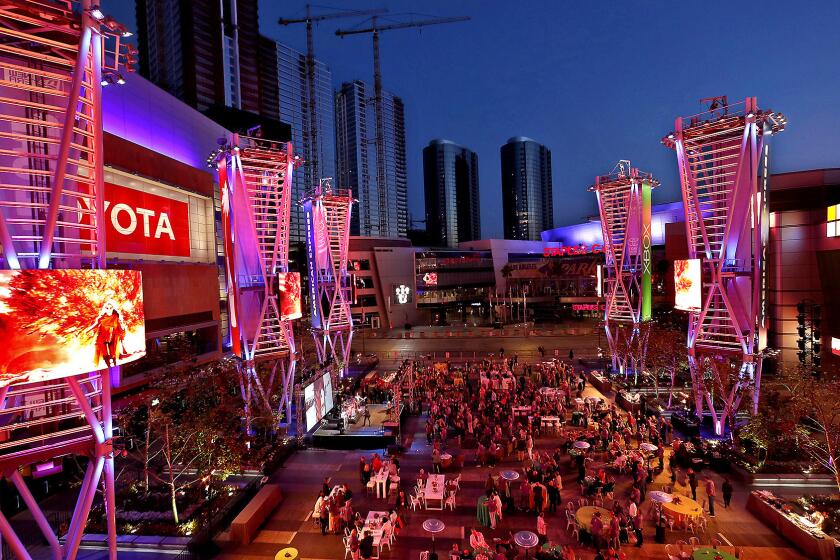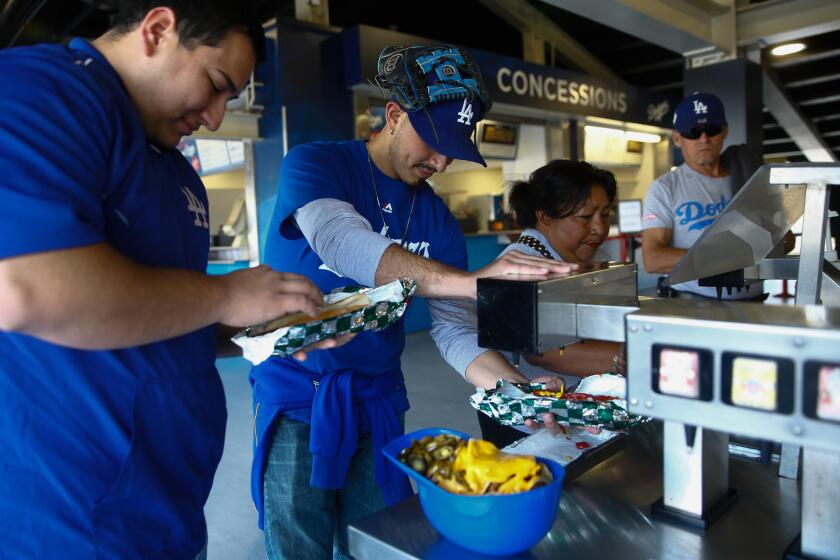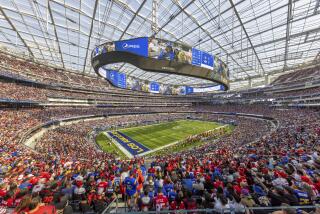As major sports shut down, one vulnerable group follows — and it might not recover
The Catch is one of the most beloved restaurants in Anaheim, adjacent to Angel Stadium and the City National Grove theater, and down the street from Disneyland, Honda Center and the Anaheim Convention Center.
“In the epicenter of Orange County’s sports and entertainment venues,” the restaurant’s website reads.
Those venues all went dark this week. On Friday, so did The Catch.
“Unfortunately, with the temporary closing of Disneyland, the cancellation of conventions and sporting events, the management of The Catch has made the difficult decision to close our restaurant until further notice,” according to a statement posted on the restaurant website Friday afternoon.
Civic officials have long parroted “If you build it, they will come” as an economic development plan, not a movie tagline: Build a sports venue, and restaurants and shops will spring up around it.
Now, with four major sports leagues shutting down indefinitely because of the coronavirus pandemic, those restaurants and shops are the businesses likely to suffer the most. The teams and leagues might have to hash out how to account for any unplayed games within their billions in television revenue, but the small businesses that rely on game-day traffic are likely to be the companies hit hardest by the sports stoppage.
Similarly, while team owners might take a hit in profits and players might take a hit in salaries, the employees who work at those restaurants, shops and venues are at risk of losing their shifts, if not their jobs.
“So what happens with that usher at Dodger Stadium, for whom that second job is vitally important to cover the cost of day care, or other vital needs? That’s where I think it’s going to be interesting,” said David Carter, who teaches sports business at USC. “They may very well never be made whole if the games are not played, or if a league comes back and plays a shortened season. Even a few games is worth a lot of money to these individuals.”
In the grand economic pie, the sports industry represents a very small slice. In Los Angeles County alone, the workforce totals 5 million, according to the Los Angeles Economic Development Corp. (LAEDC). The regional workforce in the sports industry generates 40,000 jobs, according to an LAEDC study last year.
However, Carter said, the attention commanded by the sports industry provides a platform for fans to use in understanding the impact of the coronavirus on the economy as a whole.
“They listen to the importance of the sports economy,” he said.
For years, economists have scoffed at the economic impact statements that accompany proposals for sports venues or events. Does it really add to local spending, the economists have argued, when a resident takes the dollar that he would have spent on a concert and spends it on a ballgame instead?
The shutdown of L.A.’s marquee professional sports teams in the shadow of the coronavirus is bad news for the businesses around L.A. Live and Staples Center.
“This is a little different than if it was a normal circumstance and people have choices, where they would go to a sports activity, as opposed to going to a movie theater or a museum,” said Raymond Sfeir, director of the Anderson Center for Economic Research at Chapman University. “This time, if they are not going to a sporting event, they are not going to the others as well.
“So the situation is not comparable anymore. Not going to sports events is going to have a major impact on the economy while this is going on.”
To put a dollar figure on that impact would be folly, as no one knows how long the sports shutdown might last. But Patrick Rishe, director of the sports business program at Washington University in St. Louis, did his best to define its impact on restaurants, bars, shops and hotels around a sports venue.
“They are taking a bath right now,” he said.
“If people aren’t going to Staples Center, then potentially they’re not going to L.A. Live. I like Tom’s Urban. But I’m not going to leave Century City and go to Tom’s Urban unless I’m also going to a sporting event downtown.”
In a civic assist, the Dallas Mavericks announced Saturday that employees would be reimbursed for breakfast and lunch purchases from “small, local and independent establishments in the region.” The gesture will provide support for small businesses from hundreds of team employees, if not from the 20,000 fans that the Mavericks average at each home game.
The sports will come back at some point, but the fans might not necessarily follow, at least not right away. Carter said he had planned to accompany six friends and colleagues to the Masters, pumping four nights’ worth of spending into the Georgia economy.
“We may decide to redirect our spending,” he said. “We may decide to do something else.”
And, in an era where sports often are considered all that keeps a cable or satellite subscriber from switching to streaming, what if fans get hooked on other shows and decide they can live just fine without ESPN or SportsNet LA?
“Will they spend more time and money on Netflix and Hulu, and watch the entire catalog of ’30 for 30?’ ” Carter said.
The future of sports is particularly critical to the economic future of Anaheim. The Ducks have agreed to develop the area around Honda Center, and the Angels have agreed to do the same around Angel Stadium, but the prospect of a recession could hamper either project, and a delay in construction would mean a delay in city tax revenue.
Tim Ryan, the president of the Ducks, declined to comment. Angels spokeswoman Marie Garvey did not return a message seeking comment.
The union that represents more than 5,600 game-day workers at five local venues has an idea for the owners of the eight pro teams that play there.
Sfeir said he did not believe potential tenants would be deterred.
“The companies are going to look in the medium and longer term, when the coronavirus is no longer going to be an issue. They will continue their discussions, in my view, and eventually they will sign an agreement.
“The project in Anaheim is a long-term thing, and it hasn’t even started. I don’t think they are going to be postponing that for too long.”
Carter said it is too soon to say for sure. By the time the coronavirus threat recedes, fans might decide that the rising cost of attendance and the options for home viewing make skipping the game — and the stop at a nearby restaurant or bar — quite preferable.
“Is there going to be a tail to this whole coronavirus,” he said, “that makes people say, ‘yeah, I don’t know if we’re going to the game?’ What’s the economic impact on sports, and what’s the economic impact on real estate development if fewer people are willing to go to Anaheim Live before a game?”
More to Read
Go beyond the scoreboard
Get the latest on L.A.'s teams in the daily Sports Report newsletter.
You may occasionally receive promotional content from the Los Angeles Times.













